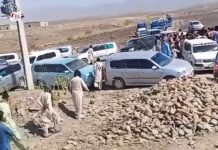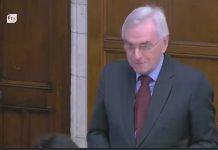TO KNOW BALOCH HISTORY
Mahdim Baluch
The leader of the BRP has released statements in serious breach of the Baloch Nationalist Narrative and presented the world at large with an inaccurate understanding of Baloch history.
Balochistan was a loosely knit tribal confederacy for centuries with major political activity and discussion being centered in and around Kalat or emanating from it. The very word Kalat was synonymous with Balochistan. The Balochistan Parliament with its Upper and Lower Houses akin to the British Parliamentary System were located there and as such it acted as a central pivot holding jurisdiction for the Baloch nation. World political figures from Europe, Africa, the Middle East and Central Asia attended the Darbar in Kalat as the symbolic heart of the Baloch Tribal confederacy.
Officials and agents of foreign governments including the British Raj operated their headquarters in Kalat from where they exercised their writ and influence across Balochistan. Major political organisations and parties including the Anjuman-e-Itehad-e-Baluchan, marking the start of a secular non-tribal nationalist movement made Kalat its work base precisely because the Balochistan National Parliament was situated there and within its walls significant issues of governance affecting the whole of Balochistan were discussed, debated and brought to some form of resolution.
Sardars from all the main tribes in Balochistan at one time or another participated in parliamentary assembly meetings in Kalat and took oaths and pledges to Balochistan. Unfortunately, some of these reneged on their promises for personal gains and sided with the occupiers seriously damaging full union and consolidation of all Baloch areas. It is for this reason that Great Souls such as Mir Yusuf Magsi and his revolutionary Faryad-e-Balochistan movement called for One centralised sovereign Baloch state with constitutional and representative government. It was in order to prevent rogue Sardars from barring the march of progress and emancipation of the common people.
Baloch Nationalist activists from Kalat state and the Anjuman met and created the Kalat State National Party which was a monumental move in Baloch political history. They gathered on the 5th of February 1937 at a convention in Sibi where they elected Mir Abdul Aziz Kurd as their first president, Malik Faiz Mohammad as their Vice-President and Mir Gul Khan Naseer as General Secretary.
The Party Manifesto issued on 1st April 1937 laid out some fundamental tenets which are just as pertinent today as they were at that time.
These include some of the following:
– All Baloch should be united by eliminating the differences
– We have a glorious traditional past and we are being deprived of our National Rights
– The Central government of Balochistan should be a Responsible Government consisting upon the elected representatives.
– The Central Government should adopt a Nationalist Approach
– The Central Government must be the Custodian of the Baloch Traditional Heritage.
The term Central Government is in reference to the Balochistan Bicameral Parliament in Kalat. They wanted it to become truly representative and work towards the emancipation of all Baloch.
It was in the Kalat Parliament that the major Resolution against merger with Pakistan was motioned as it would endanger the separate identity of Balochistan. These Baloch Nationalists were functioning within the remit of the Kalat government and wanted to strengthen it on the basis of Baloch Nationalism to make it a symbolic rallying point for the full unification and integration of all Baloch lands under one banner, one constitutional parliament and one representative government. This was the urgent call of the day then as it is now in order to thwart the occupiers attempts to divide and rule Balochistan as they please.
Consequently Baloch Nationalists maintain this unitary stance to this day and denounce Pakistani efforts to change the Baloch historical narrative. If Kalat had not been annexed, there is every possibility that the Baloch National Assembly may have evolved to a parliamentary democracy despite resistance from some Sardars. The occupation of Kalat, the political power centre of Baloch politics dealt the worst possible blow to the natural course of the Baloch political order.
The BRP right now is holding a position detrimental to the Nationalist consensus. It is for this very reason that the statements released by the BRP leader must be categorically rejected.
The Baloch tolerate different opinions amongst their political leadership but not upon historical facts that are imperative to their sovereign status. Any seasoned politician should understand it is of prime importance that issues concerning historical sovereignty are in no way undermined.
It was in the Balochistan National Parliament, Kalat that on December 12th 1947 Mir Ghouz Bakhsh Bizenjo delivered his famous speech citing the following words now forever etched into the Baloch psyche:
‘How can we sign the death warrant of 15 million Baloch….Pakistan’s unpleasant and loathsome desire that our national homeland should merge with it is impossible to concede’.
The Treaties of 1841, 1854, 1863, 1875 and 1876 were signed by the British with Kalat and were of the same format as those they had with Afghanistan and Nepal.These recognised Balochistan as an independent entity and granted it protectorate status and though they were unfortunately not honoured, are still of great historical significance to us as determinants of our sovereignty.
All the above crucial insights make it completely correct and vital that the forced annexation of Kalat on 27th of March 1948 is commemorated as the date of the occupation of Balochistan. If the leader of a political party in the West had made statements of such a magnitude as rejecting this pivotal date of occupation, their political integrity would be seriously compromised especially as if some years prior they had fully supported it.
It would be better for the BRP not to adopt a version of Baloch history propagated by Pakistan. It must distance itself from this stance. It’s representation of Balochistan at the UN and within international media must be seriously scrutinised as the spreading of this historical viewpoint will only damage the Baloch liberation movement. Pakistan attempts to dilute the Baloch National struggle at every turn and does not need additional help from so called Baloch Nationalists.
If a political party chooses to ignore the will of the majority on such a vital perspective as this now, how will they function and be held accountable after independence? Tens of thousands have been killed for upholding this very Baloch Nationalist History, tens of thousands more have been forcibly disappeared for it. This struggle is the Baloch people’s mass uprising against a brutal genocide. The time of any single individual, tribe or entity leading or controlling anything has past. This is now principally led by the masses originating from a variety of tribes and social backgrounds. We are working towards a free, fair and prosperous Balochistan for all Baloch.
A majority one tribe party or organisation sets a negative precedent unrepresentative of the democratic mandate, transparency and accountability, values integral to Baloch Mayar. Paying lip service to the democratic mandate is not good enough. We need to see jobs being advertised, interviews being held by credibly qualified persons and policies and procedures documents. Balochistan should have its most able sons and daughters leading her transition to a New Civilisational Power in the region. This is our destiny and we must claim it now.
Upon Baloch liberation, Systems must be put into place to ensure that no one entity can loot resource revenues and allocate them according to personal favours thereby impoverishing countless millions. Baloch natural resources are owned in common by the Baloch people and must be distributed equally by elected and accountable representatives clearly showing incomes and expenditures. Hundreds of billions of dollars cannot go unaccounted for ad infinitum. The Baloch masses wish to establish a true democracy and will not permit a replication of Pakistani dynastic politics in their newly established state. In Pakistan a sizeable number of people enter politics in order to steal state resources, not to serve the people. This is against all that Balochiat stands for.
The Baloch people should be very clear that any Baloch organisations whom do not clearly function in their activities according to democratic principles and processes right now are highly unlikely to do so after independence.
Bibi Mahdim Baluch
London
March 27th 2018
Balochistan Occupation Day
AZAATH BAATH BALOCHISTAN





























